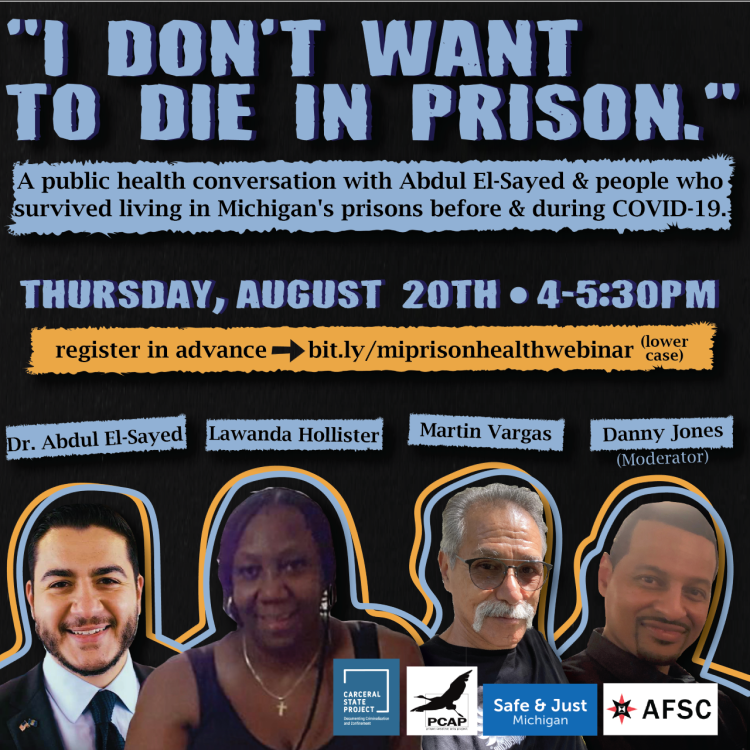
Media Advisory Thursday, August 13, 2020
Contacts: Natalie Holbrook: 734.330.0555 and Jacqueline Williams: 248.996-4010
AFSC Michigan Criminal Justice Project and Carceral State Project
Two groups working to #FreeThemAll release timely report on the impact of COVID-19 on people in prison in Michigan and continue to call on Governor Whitmer to release the long serving people in prison who are among the least likely to recidivate.
WHAT: Webinar with Abdul El-Sayed Join us on August 20, 2020 from 4:00 to 5:30 to discuss the report findings and the road to decarceration and abolition with Abdul El-Sayed and people who have lived through the horror, isolation, and disconnection of prison in Michigan. Register for the webinar here: http://bit.ly/miprisonhealthwebinar. We will also facebook live stream the webinar and it will be available recorded on YouTube
WHAT: The report entitled “I don’t want to die in prison”: Prison Conditions, Decarceration, and Mutual Aid in the Age of COVID-19 provides an up-close overview of how deeply harmful the COVID-19 crisis has been in 29 prisons in Michigan. Not only has COVID killed 68 mostly long serving people (lifers and long-indeterminate sentenced people), but it has also infected over 4,000 people in Michigan’s prisons. There is currently a new hotspot of infections at Muskegon Correctional.
While advocacy organizations across Michigan and around the country call for the mass release of transformed long-serving people who are no longer threats, these cries have been ignored by Governor Whitmer and her staff.
This report centers the hundreds of people who have reached out to AFSC throughout the pandemic and focuses on thousands of people who are serving long sentences and are ready to return home to be contributing community members. At the completion of this report, AFSC had compiled 280 pages of documentation regarding the conditions of confinement the state forces people to live in during the pandemic in Michigan’s 29 prisons. In addition, an AFSC staff member documented 48 testimonies of the experiences of people in prison. These recordings catalog everything from being locked down for weeks while sick, to lacking hygiene and sanitation protocols, to the experiences of people who lost their friends and bunkies to the virus.
In this time of extraordinary upheaval and potential for change in world history, the impact of COVID-19 on people in prison will hopefully add to the fierce determination of the public and policymakers to dismantle this current US punishment-based criminal legal system and move towards models of care that lift up community and individual healing and transformation. This report calls for sweeping changes to Michigan’s current policies and advocates for a mass reduction in the prison population, a reduction that focuses on people who have served 20 or more years and have grown or are growing old in prison.
Note to Press: We are happy to share stories and contacts for people inside who have given permission and want to be heard.
#LetMiPeopleGo #FreeThemAll #AbolishPrison #ClemencyNow
QUOTES from people in prison in Michigan
Shearod McFarland: “One of my greatest fears is dying in prison. I've been incarcerated for almost 33 years STRAIGHT - none of that leaving and coming back crap. So the notion of going through all of this misery for all of these years and then dying in this ugly place? My worst nightmare!”
Ricardo Hart: “Sitting in a Michigan prison waiting on Covid or his kinship to arrive and execute their death penalty is pure mental torture, to say the least. He is not gone from our world but fades in and out with social indifference of our human race. He survives on human stupidity and mental numbness of those who are indifferent to other human beings. There is no such thing as social distancing in Michigan's prisons, only the death penalty.”
Sharee Miller: “WE ARE WATCHING PEOPLE WE HAVE GROWN UP AND GROWN OLD WITH DIE. WE ARE ENCLOSED IN CELLS SO SMALL THAT SOCIAL DISTANCING IS IMPOSSIBLE. WE LITERALLY HAVE NOTHING TO OCCUPY OUR MINDS. SOME OF US CAN AFFORD TVS AND TABLETS, WHILE OTHER CANNOT. SO WE LAY IN BED AND THINK. ONLY TEN AT A TIME ARE ALLOWED IN THE DAYROOM LEAVING THE OTHER 178 IN THEIR BEDS.
DAY AFTER DAY AFTER DAY, NO WORK, NO SCHOOL, PHONE CALLS ARE TOO EXPENSIVE, NO VISITS, NOTHING.
OUR THOUGHTS ARE NOT GOOD AFTER TWO MONTHS AND NO END IN SIGHT. WE CANNOT EXERCISE…”